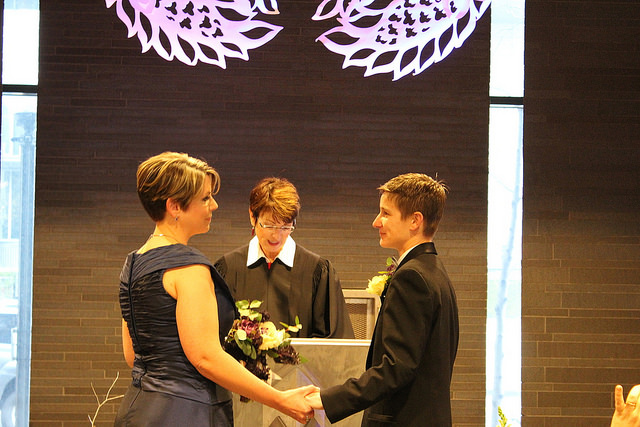The coverage of the Irish marriage referendum shows that sometimes media ‘balance’ is impossible
Ireland recently voted to not only legalise same-sex marriage, but to become the first country to do so in a referendum, and to have it enshrined in the constitution. The campaign wasn’t just notable for the optimism and positivity of the ‘Yes’ campaign, though, with court decisions to ensure a “balanced” debate let to often farcical portrayals of the referendum by the broadcasters, argues Philip O’Connor.
As the broadcast moratorium kicked in the day before Irish citizens went to the polls to vote on marriage equality, it became all the more apparent in the merciful silence – during a seismic event for Irish democracy, “balance” as it is interpreted in journalism (particularly in Irish broadcast journalism) had been a spectacular and predictable failure.
The fallout of the McKenna judgment, handed down by the Irish Supreme Court in 1995, looms large in the Irish democratic discourse, insisting as it does that it is unconstitutional for the government to spend taxpayers’ money to argue only one side of the case in a referendum. This has led to a bizarre interpretation in which public service broadcaster RTE, because of its state funding, must be scrupulous in its allocation of airtime to both sides.
In the light of that judgment and interpretation, the Independent Referendum commission is tasked with providing impartial factual information about the plebiscite. But rather than lead to a more informed and balanced discussion facilitated by the above, Ireland was instead treated to all manner of eccentrics presenting ever-darker doomsday scenarios about what would happen if gay people were allowed to marry.
Column inches stretching for miles were given over to wooly-headed amateur analysis of everything from constitutional law to social science. Opinion pieces from both sides were published, seemingly without any facts being checked. Glaring errors and misleading information went uncorrected and unacknowledged.
In Dublin, where RTE’s TV and radio studios are based, hours and hours of airtime were dedicated to “debates” featuring arguments that ranged from the spurious to the downright offensive. Despite initial overwhelming support (measured at over 70 per cent) for the Yes side, the fear of being seen unbalanced extended to privately-owned media too, who also proceeded to provide a platform for the most extreme of opinions. But feat of being perceived as partial in this referendum is no excuse for not robustly challenging and investigating both sides of the campaign.
Declining to properly investigate and analyse the funding of both sides may appear at first glance to be balanced, but it’s not, as it is the voters who are left wondering how to follow the money. Allowing campaigners to go unchallenged with statements based on non-existent or heavily-skewed research does not provide “balance.”
Allowing campaigners to keep referring to the same unrelated subjects, over and over and over again, despite the Referendum Commission saying several times that they were of no relevance, does not provide balance. Instead, it allows the waters to be muddied – the very antithesis of what journalism, and in particular public service broadcasting, should be.
Ireland’s voters faced a situation where, under the watchful but myopic eye of the Broadcasting Authority of Ireland, editors, producers and journalists were too busy watching the clock to ensure that both sides get equal time to notice that the emperors they are interviewing were in many cases not wearing any clothes.
The result was a skewed and shallow debate about non-issues that left Irish media consumers with more questions than answers. And given that the Irish people have a tendency to leave the constitution untouched when they don’t have clarity on the issue at hand, it’s hardly surprising that the gap closed considerably in the final weeks of campaigning.
The issue – whether “marriage may be contracted in accordance with law by two persons without distinction as to their sex” – was barely been discussed, if at all, in the run-up to polling day. The elephants in the room – homosexuality and homophobia – were almost never mentioned. In the vast majority of cases, media moguls have been running scared. In some cases, “experts” put forward turned out to be nothing more than internet trolls with dubious credentials. And in the case of at least one prominent gay member of the No campaign, the most charitable thing that can be said is that if he didn’t exist, they would have had to invent him.
Forced to pick from a tiny pool of No contributors, the same faces trotted out arguments that became more and more hysterical and irrelevant. And this is where the greatest failure of journalism occurred. A journalist or broadcaster pointing this out to them would not have been in any way unbalanced. It would have been simple common sense.
Alas, it happened all too seldom. There are some notable exceptions – Philip Boucher-Hayes and Miriam O’Callaghan (RTE), Chris Donoghoe (Newstalk) and Matt Cooper (Today FM) all interrupted rants at times to point out that the contents of them were not relevant. This, unfortunately wasn’t enough to stop some of the debaters, whose ignorance of good manners was almost as broad as their ignorance of the facts. The provision of impartial information is the job of the Referendum Commission. It is not the media to be a mouthpiece for either side.
It is the job of journalists to report what happens, to question what they are told and to try to put it in context. For too long, the practice of journalism in Ireland has been drowned in a sea of moaning from vested interests fueled by an enormous sense of entitlement, and who see the media as nothing more then their own personal moral megaphone. For much of the existence of this state, the Catholic Church has been at the top of that particular queue, and to a certain extent it still is. But there can be no obligation for the media to be “balanced” when the arguments put forth are anything but.
In a time of enormous change in how we consume media, and an era where the political map of the world is being radically redrawn on an almost daily basis, freedom of speech is about being able to say whatever you want – but it does not and should not oblige anyone else to give you a platform to spout bilious irrelevant nonsense. Also implicit in freedom of speech is that your opinions and your motivations will be rigorously teased out and tested.
Freedom of speech means that you are free to think and to say and to write what you like – but no-one is under any obligation to publish or broadcast it, or indeed to listen to it or read it. The Marriage Referendum debate has been a failure of the Irish Fourth Estate, but it is not entirely the fault of journalism. We need to understand that in some issues the public is in broad agreement, and that giving 50 per cent of airtime in such situations is only going to cause unnecessary hurt and damage to fellow citizens – in this case Ireland’s gay community, who suffered almost daily humiliation at the hands of No campaigners and supine journalists.
We need to recognise that the media ultimately does not tell us what to think – only what to think about. As evidenced by the two-to-one majority in favour of yes and the powerful individual stories that ultimately guaranteed their victory, it is our families and our peers have a much greater influence on how our opinions are formed than any op-ed piece or self-aggrandising debate contribution ever could have. In short, we need to learn that balance cannot exist, and exercise common sense instead.
Ultimately, there are many rights that come with citizenship, but one of the most important responsibilities we have is to understand the consequences of exercising our vote. And that is something nobody should be relying on the media for.
—
This post gives the views of the authors, and not the position of Democratic Audit UK, nor of the London School of Economics. Please read our comments policy before posting
—
 Philip O’Connor is an Irish journalist, producer and broadcaster based in Stockholm, Sweden. For several years I have run the ourmaninstockholm.com blog commentating on communication in Irish media and politics.
Philip O’Connor is an Irish journalist, producer and broadcaster based in Stockholm, Sweden. For several years I have run the ourmaninstockholm.com blog commentating on communication in Irish media and politics.






 Democratic Audit's core funding is provided by the Joseph Rowntree Charitable Trust. Additional funding is provided by the London School of Economics.
Democratic Audit's core funding is provided by the Joseph Rowntree Charitable Trust. Additional funding is provided by the London School of Economics.
Excellent piece – media ‘balance’ doesn’t mean journalists shouldn’t challenge : Democratic Audit UK – https://t.co/Hj61L9GRiP
@democraticaudit Balance doesn’t mean passive apathy https://t.co/r1gR7jRLFy via @robg8
“Glaring errors and misleading information went uncorrected and unacknowledged.” #MarRef #WeMadeHistory https://t.co/v9IzqjbImY
Interesting on balance in #MarRef coverage but repeats McKenna judgement fallacy.
@democraticaudit @philipoconnor https://t.co/1vRX1MdjHX
Interesting discussion of balance but repeats the fallacy that the broadcasting rules around referendums derive from the McKenna Judgement. In fact it was the Coughlan Judgement of 2000 that led to the current BAI rules and the broadcasters’ own interpretation of the need to provide balance.
RTÉ is not state funded and doesn’t fall under the terms of the McKenna Judgement, which was prevents the government of the day spending public money to promote one or other side in a referendum,
It is not just Ireland that has problems with ‘balance’ rules (and more specifically their interpretation by state radio and tv). In the UK, during the London Mayor election, state radio and tv (BBC in particular) gives vast amounts of free media allowing chosen candidates to say the same things again and again and again. In essence it is advertorial coverage, dull, bland and without any proper journalistic input. The journalists are just there as stopwatches or cardboard cutouts. Those same ‘balance’ rules effectively ban all the other candidates from the screens at all for the duration of the campaign.
The problem in Ireland was surely not so much the allowance of equality of time, but in the broadcasters’ failure (as in the UK) to step up to the plate and provide proper coverage. Everything on tv now has to be entertainment, and politics, for the media, is boring. This is why they want what you describe as those ‘all manner of eccentrics’ – they make ‘good tv’ entertainment. Rather than attack ‘balance’ which has to be the core, it is more important to ensure that there is real balance and that it delivers a balanced debate and coverage. Once again the broadcasters have failed, not the concept of genuine balance.
The coverage of the Irish marriage referendum shows that sometimes media ‘balance’ cannot be achieved https://t.co/F6nEtZ8zML
What does the coverage of the Irish marriage referendum show us about media ‘balance’? https://t.co/ipCyh2afGd
The coverage of the Irish marriage referendum shows that sometimes media ‘balance’ is impossible https://t.co/WNUm43rElw
The Irish Marriage Equality Referendum and media ‘balance’, by @philipoconnor : https://t.co/C3aeb5CQ6x https://t.co/EstIWeWwql
The coverage of the Irish marriage referendum shows that sometimes media … – Democratic Audit UK https://t.co/5ux3gCQbkG
https://t.co/FDFLtM0Rl8 The coverage of the Irish marriage referendum shows that sometimes media … -… https://t.co/IJVX3hTU9m #blogging
The coverage of the Irish marriage referendum shows that sometimes media ‘balance’ is impossible https://t.co/F6nEtZ8zML
The coverage of the Irish marriage referendum shows that sometimes media ‘balance’ is impossible https://t.co/oarsuOdMjK #Option2Spoil